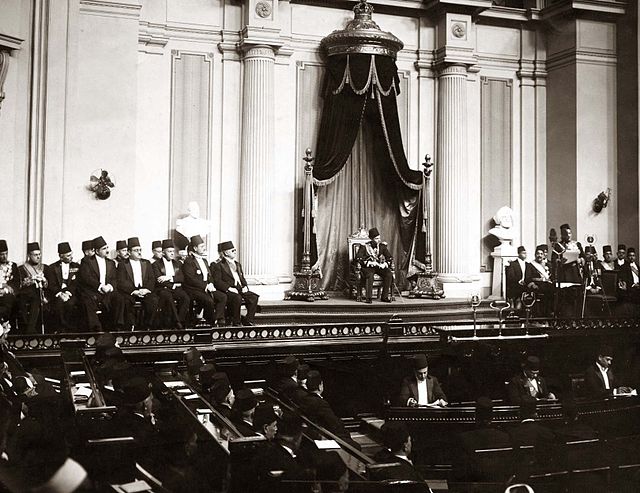Free Officers movement (Egypt)
The Free Officers were a group of revolutionary Egyptian nationalist officers in the Egyptian Armed Forces and Sudanese Armed Forces that instigated the Egyptian revolution of 1952. Initially started as a small rebellion military cell under Abdel Moneim Abdel Raouf, which included Gamal Abdel Nasser, Hussein Hamouda, Khaled Mohieddin, Kamal el-Din Hussein, Salah Nasr, Abdel Hakim Amer, and Saad Tawfik, it operated as a clandestine movement of junior officers who were veterans of the Palestine War of 1948-1949 as well as earlier nationalist uprisings in Egypt in the 1940s. The nationally respected war hero Mohamed Naguib joined the Free Officers in 1949. Naguib's hero status, and influence within the army, granted the movement credibility, both within the military and the public at large. He became the official leader of the Free Officers during the turmoil leading up the revolution that toppled King Farouk in 1952. The Movement was succeeded by the Revolutionary Command Council after the overthrow of Farouk that was later succeeded by the Supreme Council of the Armed Forces.

The Free Officers after toppling the monarchy, 1953. Counterclockwise: Zakaria Mohyeddin, Abdel Latif Boghdadi, Kamal Eddine Hessien (standing), Nasser (seated), Abdel Hakim Amer, Mohamed Naguib, Youssef Sedeek and Ahmad Shawki
Front row from left: Abdel Latif Boghdadi, Gamal Abdel Nasser, Mohamed Naguib, Abdel Hakim Amer, Salah Salem. Mohamed Anwar Sadat. Back row from left: Hussein el-Shafei, Khaled Mohieddin, Gamal Salem, Kamal el-Din Hussein, Hassan Ibrahim, Zakaria Mohieddin.
Abdel Latif Boghdadi (left) Gamal Abdel Nasser (center left) Salah Salem (center right) Abdel Hakim Amer (right).
The Egyptian revolution of 1952, also known as the 1952 coup d'état and 23 July Revolution, was a period of profound political, economic, and societal change in Egypt. On 23 July 1952 the revolution began with the toppling of King Farouk in a coup d'état by the Free Officers Movement. This group of army officers was led by Mohamed Naguib and Gamal Abdel Nasser. The Revolution ushered in a wave of revolutionary politics in the Arab World, and contributed to the escalation of decolonisation, and the development of Third World solidarity during the Cold War.
The leaders of the Revolution, Mohamed Naguib (left) and Gamal Abdel Nasser (right) in a Cadillac
King Farouk I of Egypt in Parliament listening to Mustafa el-Nahhas Pasha's speech.
Poster from the Egyptian nationalist Ahmed Hussein for complete independence
Egyptian police fighting in the Battle of Ismalia







